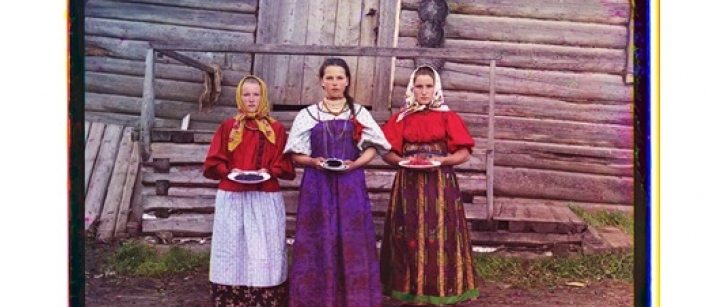Mead gallery’s new exhibitions – Review
The latest exhibition on at Mead Gallery presents the viewer with two exhibitions; Close and Far: Russian Photography Now and The Unfinished Conversation by John Akomfrah. Close and Far presents a survey of contemporary Russian photography alongside a collection of works by early colour photographer Sergei Prokudin-Gorsky. An immediately striking feature of Prokudin-Gorsky’s work is the survey that it attempts of rural and developing Russia between 1905 and 1915. This wide survey breaks with any attempt to provide a mono-cultural view of the land; taking in steel mills, young Jewish students, the emir of Bukhara, Greek peasant women in Georgia, Dagestani Sunni Muslims, Austro-Hungarian prisoners of war and various medieval buildings, all in stunning saturated colour. Cartier-Bresson may have been the master of the moment but Prokudin-Gorsky explored what a photographic survey can achieve and what colour photography can elicit.
The contemporary Russian photographers, whose work surrounds Prokudin-Gosky’s, contrasts the current Russia with that of pre-revolutionary Russia. But we never get the whole picture. Instead we see the border zone between city and the country in Alexander Gronsky’s photos, where folk dig out their own spaces for leisure on the edge of construction sites and highways. Olya Ivanova’s intimate photographs of people in rural Russia among their possessions speaks to a novel way of exploring regional identity and, combined with her family archive photos, brings out the sense of biographical elements in any history. Max Sher’s documentation of apartments and businesses gives a peek into the everyday world of Russian buildings while Taus Makhacheva’s video combines poses abstracted from Russian paintings and farming guide books performed on a mountain top in the Caucuses. Sher’s work seems to be immediately comprehensible in aesthetic terms while Makhacheva’s takes a fair amount of extra textual information to become anything but a man on a pretty mountain.
Dimitri Venkov’s fictional documentary seems a jarring point, critiquing contemporary academia’s tendency toward obfuscatory language (case in point). It constructs a community who live next to the Moscow ring road and have adopted all aspects of it; the trash, the sound, and stereotypes of those who drive it, into their highly ritualised life. I can’t help but think that this takes a stab at the likes of Stuart Hall, the focus of the other exhibition featured, The Unfinished Conversation.
Stuart Hall was a pioneer of cultural studies in the UK, interrogating everyday practices for their cultural meaning in search of understanding peoples in their specific situations. Akomfrah’s three-screen installation brings out Hall’s life in a way that does justice to his legacy by situating his life around the political events of mid-century UK to create a biography that is so much more than a list of achievements and reasons to respect him.
In all the two separate exhibitions bleed into one another to present different visual expressions of cultures and the specific people that inhabit them, sometimes reading a person into a time and place, but in others letting the individual cut through the world around them that often feels constraining.

Comments